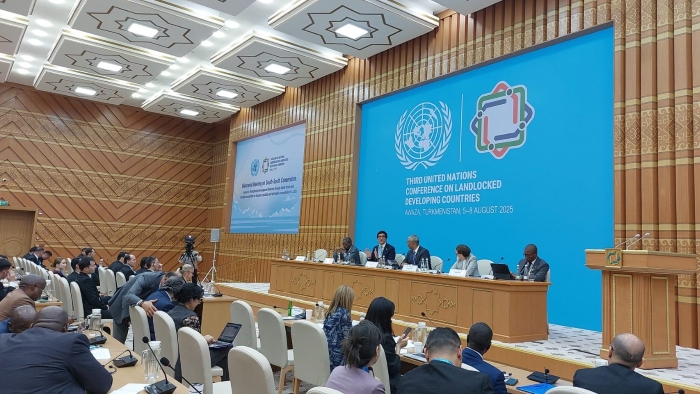Our Terms & Conditions | Our Privacy Policy
EU Highlights South-South Cooperation to Boost LLDCs at UN Conference
During the South-South Ministerial Meeting at the Third UN Conference on Landlocked Developing Countries (LLDCs), the European Union (EU) emphasized the transformative potential of South-South cooperation in overcoming barriers faced by LLDCs. In a session focused on leveraging such cooperation to enhance regional integration through trade facilitation, Mr. Eduards Stiprais, EU Special Representative for Central Asia, delivered a statement outlining the EU’s commitment to supporting LLDCs in unlocking economic opportunities.
LLDCs grapple with challenges like geographic isolation, high transport costs, and vulnerability to external shocks.
Stiprais highlighted that South-South cooperation offers a pathway for LLDCs to share knowledge, best practices, and technologies in critical areas such as trade facilitation, infrastructure, and climate resilience. By fostering joint investments in transport corridors and digital networks, LLDCs can break economic isolation, create jobs, and strengthen regional value chains.
The EU plays a pivotal role through triangular cooperation, facilitating platforms for LLDCs and their partners to collaborate on customs modernization, border management, and trade reforms. These efforts aim to streamline procedures and reduce trade costs, aligning with the Awaza Programme of Action, which underscores the importance of sustainable transport networks in unlocking LLDCs’ economic potential.
Notable EU-supported initiatives include:
- East Africa’s Northern Corridor: The EU backs the Northern Corridor Transit and Transport Coordination Authority, enabling Uganda, Rwanda, and South Sudan to improve transport routes, harmonize customs, and reduce border delays, significantly boosting regional trade.
- Central Asia’s Multimodal Networks: The EU supports South-South initiatives among Kyrgyzstan, Tajikistan, and Kazakhstan to develop transport networks connecting landlocked countries to regional hubs and ports.
- Africa’s PIDA: The EU collaborates with the African Union’s Programme for Infrastructure Development in Africa (PIDA), fostering transport projects that link LLDCs to coastal ports, addressing logistical bottlenecks.
These initiatives demonstrate how South-South cooperation, amplified by EU support, is transforming transport systems and integrating LLDCs into global trade networks. The EU also provides technical assistance, capacity building, and co-investment in infrastructure under South-South frameworks, while promoting regional trade agreements to reduce barriers and encourage private sector partnerships.
In his closing remarks, Stiprais reaffirmed the EU’s commitment to fostering resilient regional value chains and deepening integration. “South-South cooperation, encouraged by international triangular initiatives, is a catalyst for LLDCs’ development,” he stated. “Together, we can build a future where geography no longer limits opportunity.” ///nCa, 9 August 2025 (photo credit – EU in Turkmenistan)
Images are for reference only.Images and contents gathered automatic from google or 3rd party sources.All rights on the images and contents are with their legal original owners.



Comments are closed.